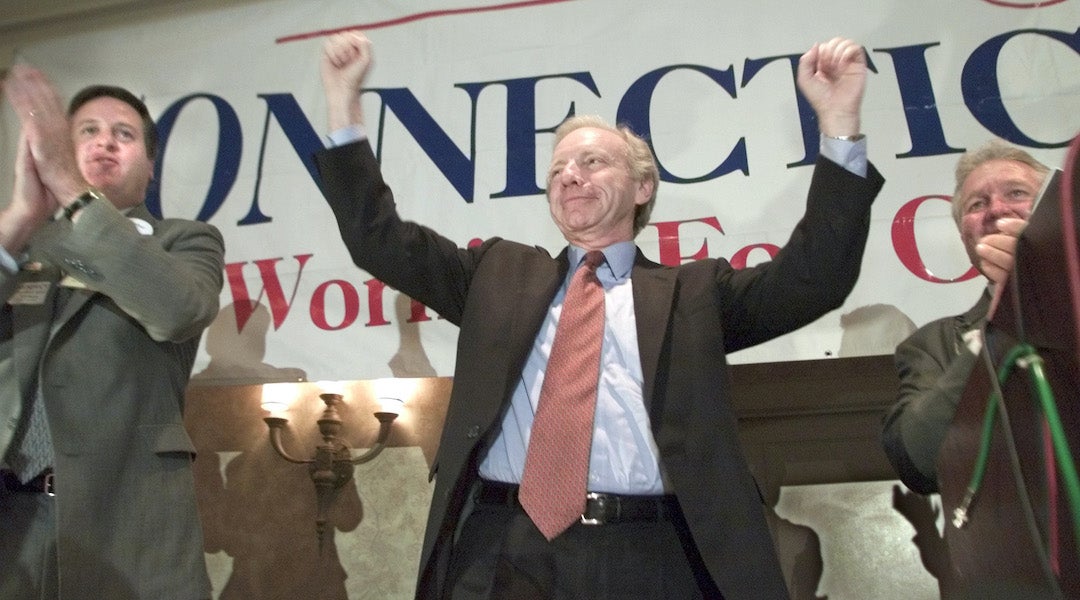When Al Smith campaigned for U.S. president — and lost — in 1928, his Roman Catholicism was used against him. When John F. Kennedy successfully ran for president in 1960, he felt the need to make speeches that distanced himself from the pope.
But Sen. Joseph Lieberman’s Orthodox Judaism is not likely to be a burden for him as the Democratic senator from Connecticut goes on the stump as Al Gore’s running mate.
In fact, analysts say, Lieberman’s beliefs may even help him and Gore.
Americans apparently have come a long way when it comes to the acceptance of public officials from minority religions — even if they might have a little way to go, as indicated by this comment about Lieberman from Sen. John Breaux (D-La.).
“I think people don’t care so much about where he goes to church on Sunday, but just that he has the moral values and principles to lead the country,” Breaux said.
Despite misunderstandings about when Jews worship, a poll that has tracked American views on religion and the presidency supports the view that religion is less of a factor for voters than it used to be.
In 1937, the Gallup organization found that 46 percent of Americans would vote for a Jewish person for president. By 1999, that number had climbed to 92 percent.
Smith, the son of Irish immigrants, was the Democratic governor of New York when he ran for president in 1928 against Republican Herbert Hoover.
Smith had other things that hurt him in that election. He was against the prohibition on alcohol then in effect in the United States, and he was running against the incumbent party during a period of economic prosperity that lasted until the stock market crash of 1929 and the Great Depression.
But his religion was certainly a factor. One rumor circulated that Smith was in favor of building a tunnel underneath the Atlantic Ocean to connect Washington to the Vatican, and a leaflet published in New York read:
“When the Catholics rule the United States, And the Jew grows a Christian nose on his face, When the Pope is the head of the Ku Klux Klan, In the land of the Uncle Sam, Then Al Smith will be our President, And the country not worth a damn.”
Smith lost the election to Hoover, earning 41 percent of the vote.
By 1960, when Kennedy ran against Republican Richard Nixon, anti-Catholicism had waned, but it had not dissipated entirely.
Questions were raised about the Massachusetts senator’s “dual loyalty” — that as a Catholic, he owed more allegiance to the Vatican than to the United States. Even some liberal Protestant theologians voiced concerns about the lack of independence within the Roman Catholic Church.
In a speech at a Houston hotel in September, Kennedy decided to tackle the issue head-on.
“I believe in a president whose views on religion are his own private affair, neither imposed on him by the nation nor imposed by the nation upon him as a condition to holding that office,” Kennedy said.
“I believe in an America where the separation of church and state is absolute,” Kennedy said, adding that he opposed public funds for any church or church school.
That speech is credited with having put the issue to rest in the election – – although while Kennedy earned 80 percent of the Catholic vote, he received less than one-third of the Protestant vote.
Observers say attitudes have changed in the United States in the past 40 years. Lieberman himself supports school voucher plans that provide government funds to help needy students attend parochial or private schools. Districts with minuscule Jewish populations have Jewish representatives in Congress.
“There will still be a whispering campaign against Joe Lieberman, and there will still be an anti-Semitic vote,” said Allan Lichtman, the chairman of the department of history at American University.
But, he added, “those who would not be likely to vote for Joe Lieberman on religious grounds would not be likely to vote for Al Gore anyway.”
Gore doesn’t need any help with the Jewish vote. Jews overwhelmingly vote Democratic, and the Clinton-Gore administration has been popular with most Jewish voters.
Of course, Gore’s selection of an observant Jew could help him among Orthodox Jewish voters, whose views are closer to Republican positions on issues like vouchers and school prayer.
But if it’s not clear if Lieberman will help the vice president among Southern, conservatives, who are widely considered to be solidly in Bush’s camp.
Southern fundamentalists “would be happy to vote for Lieberman, but to vote for Lieberman, they’d have to vote for Al Gore,” said Larry Sabato, a professor of government and foreign affairs at the University of Virginia.
Many Christian fundamentalists are strong supporters of Israel — as is Lieberman.
Even among voters unlikely to support the Gore-Lieberman ticket, the moderate Connecticut senator could challenge a lot of pre-existing views about Jews in general — and Orthodox Jews in particular.
He’s fair-skinned, quiet, not wealthy — and doesn’t wear a yarmulka.
“He’s going to break a lot of stereotypes,” said Rabbi Kurt Stone, whose book about Jewish politicians, “The Congressional Minyan: The Jews of Capitol Hill,” will soon be released.
But whether the stereotypes have broken in enough minds for religion not to come into play in the voting booth remains to be seen.
As Democratic pollster Mark Mellman put it, “We had a test 40 years ago with John F. Kennedy, and we passed. We have a test with Joe Lieberman, and I think the country is going to pass.”
Id
JTA has documented Jewish history in real-time for over a century. Keep our journalism strong by joining us in supporting independent, award-winning reporting.
The Archive of the Jewish Telegraphic Agency includes articles published from 1923 to 2008. Archive stories reflect the journalistic standards and practices of the time they were published.




